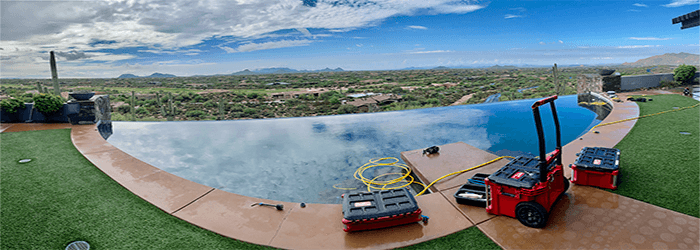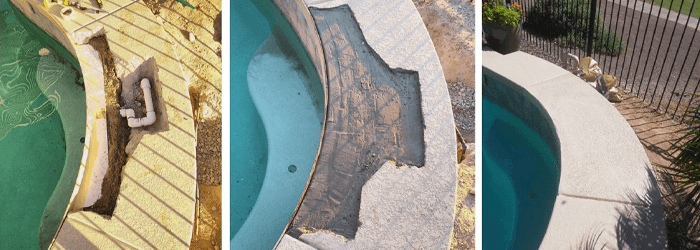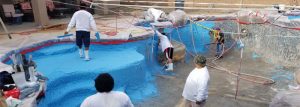Your Pool Could Be Wasting Money & Water Without You Knowing
It’s the middle of summer and your pool’s water level seems to be lower than usual. With it being 110 degrees outside, you brush it off and assume evaporation is the cause. However, this assumption may have just cost you hundreds of dollars without you even realizing it.
PinPoint Leak Detection & Repair, a Rosie on the House Certified Partner, explains the effects of pool leaks and how to prevent them.
Effects of Pool Leaks
While the hot temperatures do contribute to your pool losing water, your pool shouldn’t lose more than about 1/4 inch in one day. If you find that your pool drops more than that, there’s a chance you have a leak. A leaky pool is wasteful.
Wasted Money
Pool leaks can wreak havoc on your pool and yard without ever being visible to the naked eye. The longer they go unnoticed, the more damage they cause and the more money you’ll end up spending on repairs later on.
Wasted Water
 While repairs can always be done to reverse the damage, the lasting effects on the environment aren’t as easy to remedy. As you may know, Arizona has officially entered a water shortage. While it hasn’t directly affected residents, that doesn’t mean it’s not a future possibility. It’s important now more than ever to do what we can to conserve our water supply before it’s too late. Your pool could leak hundreds of gallons. Large commercial pools could leak thousands. Now multiply that by the estimated 20% of pools in AZ that are leaking, and the total amount of water being wasted is unsettling.
While repairs can always be done to reverse the damage, the lasting effects on the environment aren’t as easy to remedy. As you may know, Arizona has officially entered a water shortage. While it hasn’t directly affected residents, that doesn’t mean it’s not a future possibility. It’s important now more than ever to do what we can to conserve our water supply before it’s too late. Your pool could leak hundreds of gallons. Large commercial pools could leak thousands. Now multiply that by the estimated 20% of pools in AZ that are leaking, and the total amount of water being wasted is unsettling.
Signs of Pool Leaks
While the most obvious sign of a pool leak is water loss, there are other signs to also look out for. If you notice at least one of these signs, we recommend conducting a DIY home leak test. If the results confirm a leak may be present, contact a professional immediately. For instructions on the DIY test, click here.
Most common signs of a pool leak:
1 | Higher Water Bills
While higher water bills can occur for a variety of reasons, a significantly large increase likely points to a leak. This sign is especially important for those with an auto-filler since the pool’s water level is automatically being adjusted for you. With water being automatically added, you probably won’t notice the water level dropping, so the excessive water use will only be obvious on your water bill.
2 | Chemical Imbalance
Balancing the chemicals in your pool should be a part of regular maintenance. Whether you do it yourself or you hire a pool maintenance professional, your pool’s water should be tested weekly and adjusted accordingly. When your pool loses water, it takes the chemicals along with it, giving algae the chance to grow. So, if you find that your pool’s chemical levels are becoming difficult to keep balanced or if algae is consistently present, a leak is likely the culprit.
3 | Wet Spots
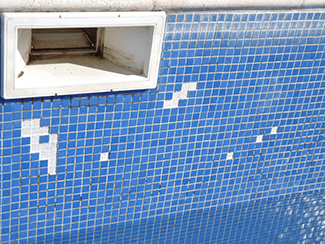
Lingering wet spots in your yard or pool deck are another common sign of a leaking pool. One note to make here is that just because you find consistent wet spots in a particular spot, doesn’t guarantee that the leak is located there. Water from a leak travels. Wet spots could pop up in one area of the yard while the actual leak is in a completely different area. So, before you dig up the area with wet spots, contact a leak detection professional to pinpoint the exact location of the leak.
4 | Cracked or Falling Tiles
Cracked tiles can naturally happen due to the movement of the earth’s surface over time. Another reason tiles become cracked is because of the water level dropping too low. When the water drops too low, the tiles are exposed to excessive sunlight which dries them out and makes them prone to cracking. Once a crack has formed, water will find its way through and slowly begin to damage the pool’s surface and structure.
Avoiding Pool Leaks
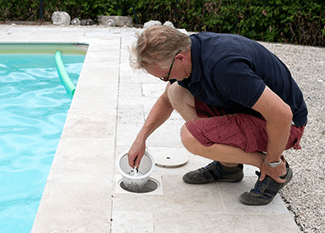 The best way to avoid pool leaks is to keep up with regular maintenance and repairs. Keeping chemicals balanced, emptying baskets, vacuuming, brushing, and equipment monitoring, are all a part of regular maintenance. Just like you do regular maintenance on your car to keep it in good shape, the same goes for swimming pools. On top of maintenance, we always recommend regular equipment inspections to ensure everything is operating properly. If you notice anything is broken or not working, repair it immediately to avoid
The best way to avoid pool leaks is to keep up with regular maintenance and repairs. Keeping chemicals balanced, emptying baskets, vacuuming, brushing, and equipment monitoring, are all a part of regular maintenance. Just like you do regular maintenance on your car to keep it in good shape, the same goes for swimming pools. On top of maintenance, we always recommend regular equipment inspections to ensure everything is operating properly. If you notice anything is broken or not working, repair it immediately to avoid
further damage to the rest of your pool and its equipment. One issue can create a domino effect of problems and before you know it, that one small repair just became multiple big ones.
“One of the most intriguing aspects of PinPoint Leak Detection & Repair is they can detect AND REPAIR leaks without draining the pool. This makes the repair much less intimidating on the front end,” says Rosie.
###
PODCAST
Don’t assume your pool is losing lots of water from evaporation. It could be leaking in places that are not obvious wasting money and water. Ian Hanley of Pinpoint Leak Detection And Repair discusses common and uncommon places they’ve found trouble spots, some of the signs of a leak and the most intriguing aspect is the techniques they use to detect AND REPAIR leaks without draining the pool. Podcast page with expanded content.
CONTENT PARTNER | PINPOINT LEAK DETECTION & REPAIR
 PinPoint Leak Detection & Repair is Rosie Certified, equipped and ready to help all of our Rosie listeners with their pool leak needs. We are licensed, bonded, insured and have over 20 years in the pool industry. As a Green Gilbert Business, we strive to help the continuous water conservation efforts, one leak at a time. Call them today at (602) 777-0771!
PinPoint Leak Detection & Repair is Rosie Certified, equipped and ready to help all of our Rosie listeners with their pool leak needs. We are licensed, bonded, insured and have over 20 years in the pool industry. As a Green Gilbert Business, we strive to help the continuous water conservation efforts, one leak at a time. Call them today at (602) 777-0771!
PHOTO CREDITS:
- PinPoint Leak Detection
- AZCentral.com
- Shutterstock

